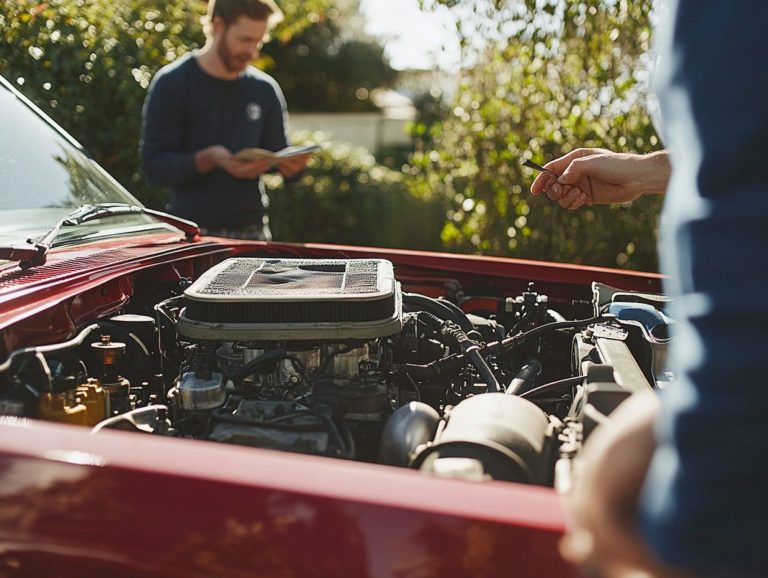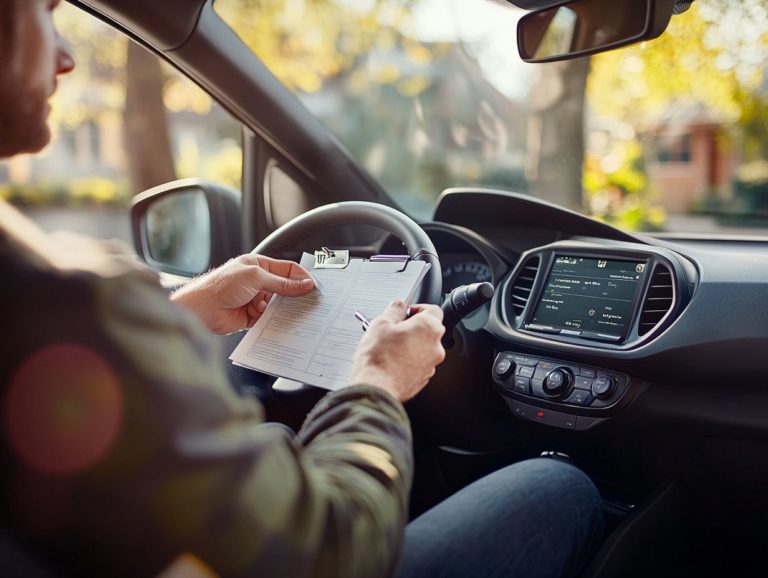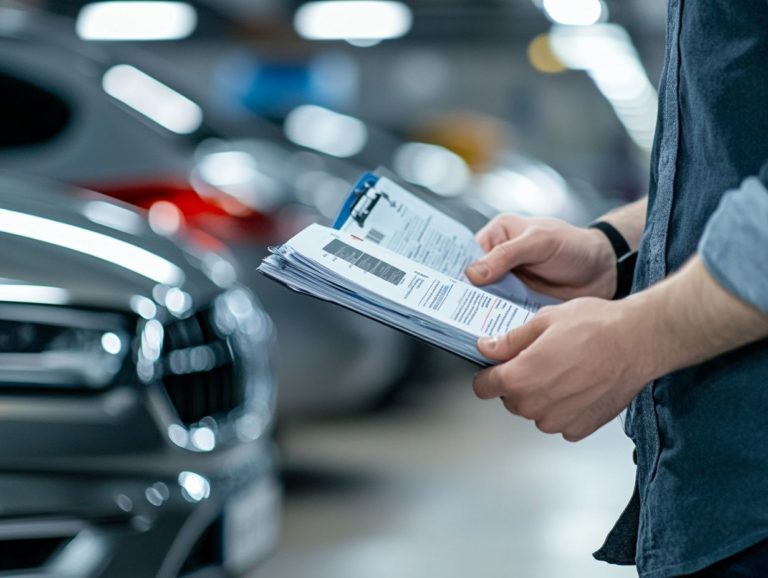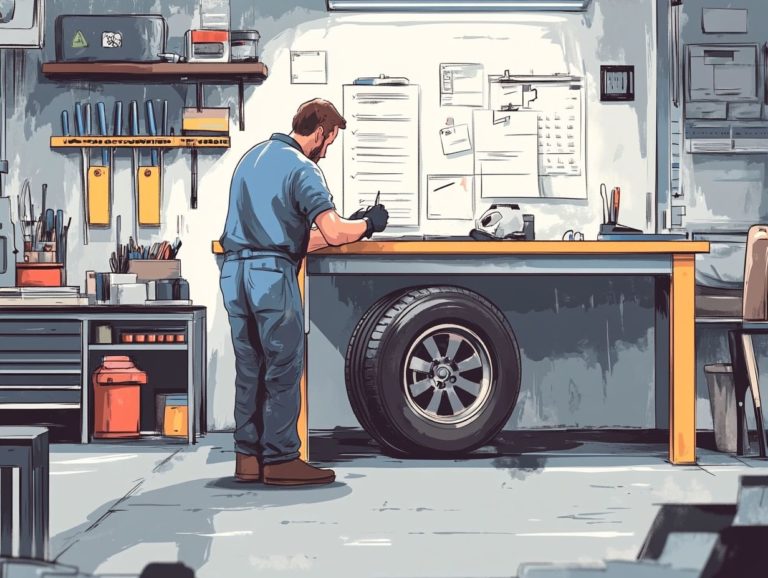How to Buy a Used Car at Auction
Buying a used car at auction can be an exhilarating and rewarding journey, presenting you with unique opportunities and advantages that are hard to come by elsewhere.
However, navigating the auction landscape demands a bit of knowledge and preparation. Let s dive into the exciting world of car auctions! This guide covers the various types of car auctions, weighs the pros and cons of bidding, and offers essential tips for your research, preparation, and attendance at an auction.
This guide also covers the crucial steps to take after securing your winning bid, ensuring a seamless transition from auction to ownership.
Immerse yourself in this guide and uncover how to elevate your car auction experience to new heights!
Contents
- Key Takeaways:
- Understanding Car Auctions
- Researching and Preparing for the Auction
- Attending the Auction
- Post-Auction Process
- Frequently Asked Questions
- What is an auction and how can I buy a used car at one?
- What are the benefits of buying a used car at auction?
- What should I do before attending an auction to buy a used car?
- How do I bid on a used car at auction?
- Can I finance a used car purchased at auction?
- What should I do after buying a used car at auction?
Key Takeaways:
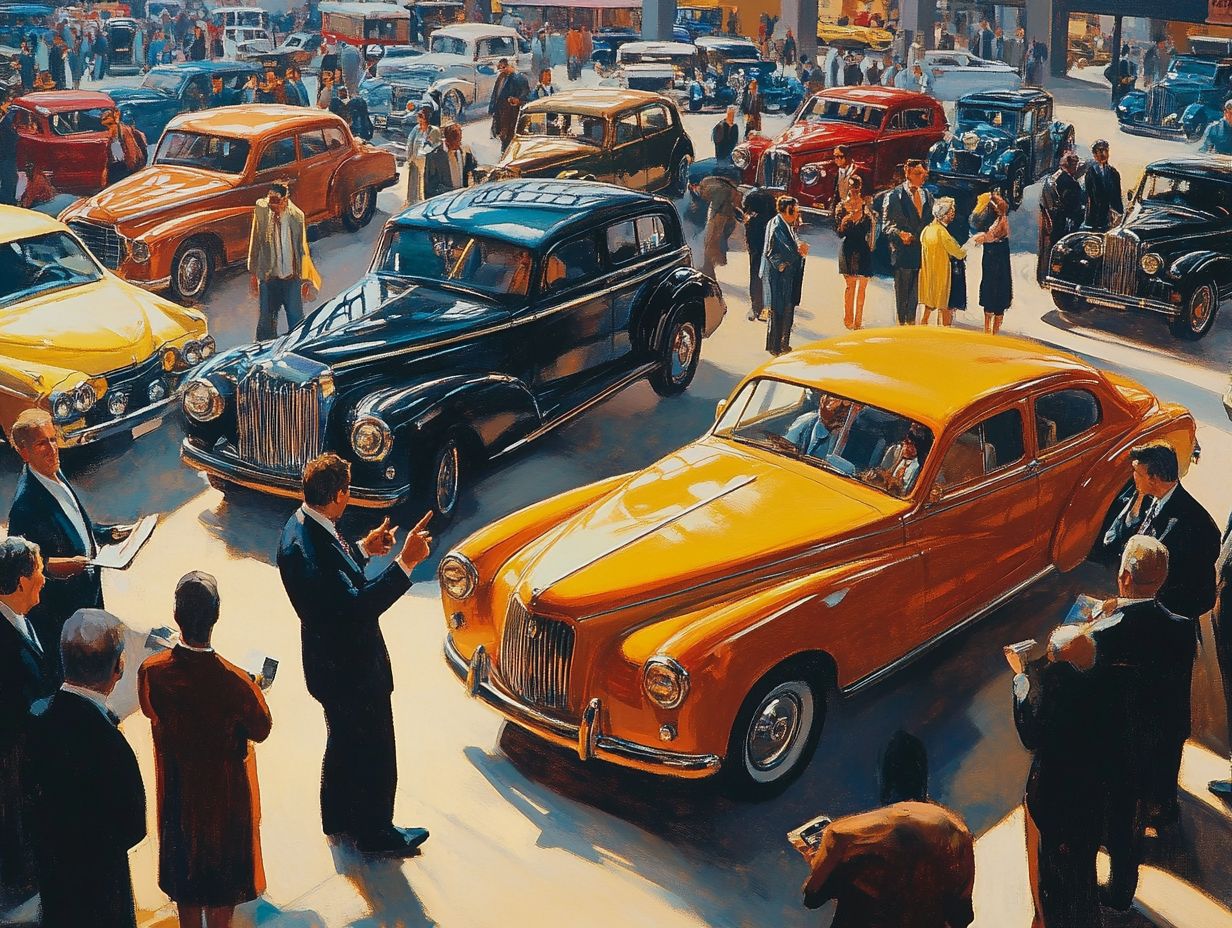
- Do your research on the different types of car auctions and their pros and cons to determine which is the best fit for you.
- Set a budget and bidding strategy before attending the auction to avoid overspending and increase your chances of winning.
- After winning the bid, finalize the purchase and thoroughly inspect the car before dealing with any potential issues that may arise.
Understanding Car Auctions
Understanding car auctions is crucial for anyone keen on the vehicle purchasing process, whether you are a seasoned bidder or a person who is new to this journey as a first-time buyer.
Car auctions come in several forms, such as public auctions, online platforms, and dealer-only events, each with its own unique nuances. Familiarizing yourself with how these auctions operate, the role of the auction house (the organization that facilitates the auction), and the importance of researching a vehicle s history can greatly enhance your experience and influence the fair market value of the cars.
By mastering the intricacies of the auction process, you can make informed decisions and uncover remarkable deals on vehicles.
Types of Car Auctions
Car auctions come in various flavors, each designed to meet the unique preferences and requirements of different audiences, including public auctions, online auctions, and dealer auctions.
Public auctions typically offer broad accessibility, inviting anyone interested in acquiring a vehicle to join the fray, which often creates a vibrant competitive atmosphere. In contrast, online auctions provide unparalleled convenience and flexibility, allowing you to bid from virtually anywhere. This attracts a diverse crowd, though it may sacrifice some of the immediacy and thrill of the traditional bidding experience.
Auction houses often cultivate their reputations based on the quality of service they provide and the types of vehicles they showcase, significantly influencing buyers’ perceptions. Dealer auctions specifically target professional buyers in search of rare and high-quality inventory. These events often present exclusive opportunities that can lead to advantageous purchasing options for businesses within the automotive industry.
Pros and Cons of Buying at Auction
Purchasing a vehicle at an auction comes with its own set of advantages and disadvantages that you should weigh carefully before diving into the bidding process.
The thrill of competitive bidding can lead to lower prices, often resulting in substantial savings especially when you consider that a buyer’s premium (an extra fee added to the winning bid) might be more favorable than the typical dealership markups. Many auctions offer you the chance to inspect the vehicle in advance, allowing you to gauge its actual condition and avoid any unwelcome surprises down the line.
However, it’s crucial to stay vigilant about auction fees that can sneakily inflate the total cost. Additionally, be prepared for the possibility of unexpected repair bills cropping up after your purchase. If not assessed properly, what initially seems like a fantastic deal could quickly morph into a financial headache.
Researching and Preparing for the Auction
Researching and preparing for the auction is an essential step that can significantly impact your success in buying a car. It involves gaining a clear understanding of the available vehicles, establishing your budget, and crafting a well-thought-out bidding strategy.
Researching the Cars Available
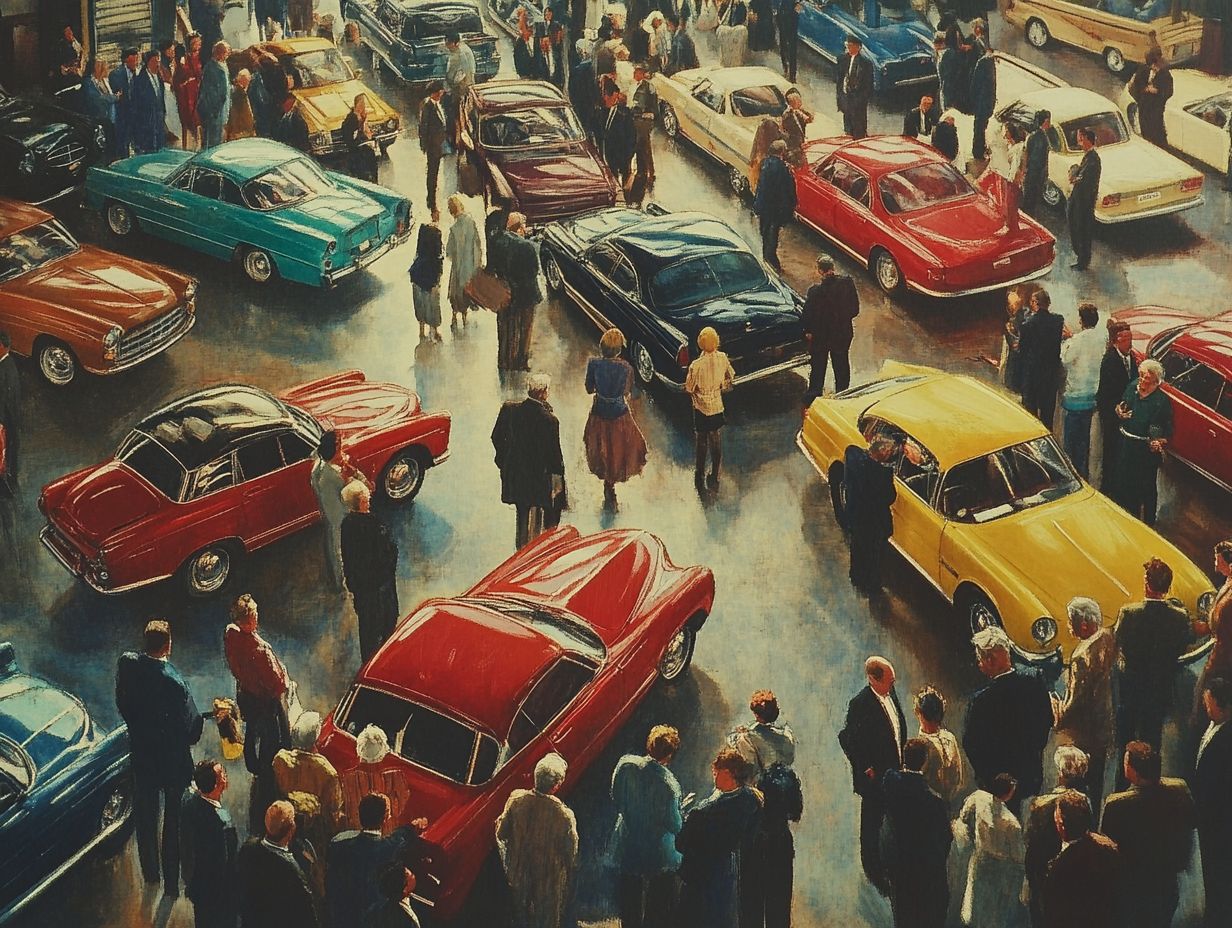
Thoroughly researching the cars available at the auction is essential for making informed decisions. Understanding the auction inventory is key.
Investing time in valuable resources like Edmunds and CarFax can significantly enhance your research process. These platforms offer comprehensive vehicle history reports that detail past accidents, service records, and ownership changes.
This information allows you to evaluate the reliability and value of a potential purchase more effectively. When you assess the auction inventory with a clear grasp of your personal needs and budget, you set yourself up for success.
By comparing the current listings against your budgetary constraints and desired features, you can make smarter choices that ultimately lead to a more satisfying purchase experience.
Setting a Budget and Bidding Strategy
Setting a budget and developing a bidding strategy are critical steps in the auction process. These steps can greatly enhance your car buying experience.
By carefully considering the auction fees and buyers’ premium, you can sidestep unwelcome surprises that could derail your efforts. Make sure you include these costs in your calculations to avoid surprises.
A solid bidding strategy knowing when to hold back and when to be aggressive plays a pivotal role in navigating the competitive auction process. You should research vehicle prices and familiarize yourself with the auction environment to make well-informed decisions.
Setting a maximum bid gives you the power to maintain discipline. This allows you to walk away gracefully if the price surpasses your predetermined spending limit.
Attending the Auction
Attending the auction necessitates thoughtful preparation. You ll want to ensure you re registered, know exactly what to bring, and familiarize yourself with effective bidding strategies.
What to Bring and How to Register
Knowing exactly what to bring and how to register for the auction is vital for ensuring a smooth experience when purchasing a vehicle. With the right preparation, you can navigate the auction process with confidence.
It’s essential to have certain documents ready, such as a valid driver’s license, proof of funds, and any required tax identification numbers. This paperwork not only makes registration seamless but also signals your serious intent to the auction personnel.
Making cash payments on auction day is crucial; many sales don’t accept credit or debit cards. Be aware that various auction fees may apply, and being informed helps you avoid any unwelcome surprises.
With thorough preparation, you can streamline the entire bidding experience and acquire your vehicle without unnecessary hassle.
Tips for Bidding and Winning
Mastering the art of bidding and winning at car auctions can significantly boost your chances of securing the perfect vehicle without breaking the bank. Taking the time to craft a practical bidding strategy is essential in these competitive arenas.
By setting a maximum bid ahead of time, you can maintain your financial boundaries while keeping a watchful eye on the competition. This will ensure you re not caught off-guard by other bidders.
Equally important is conducting thorough inspections before the auction; understanding a car s condition can profoundly influence your decision-making process. Managing your expectations is key to avoiding the traps of overbidding.
By following these strategies, you can navigate the auction process with greater confidence and effectiveness.
Post-Auction Process
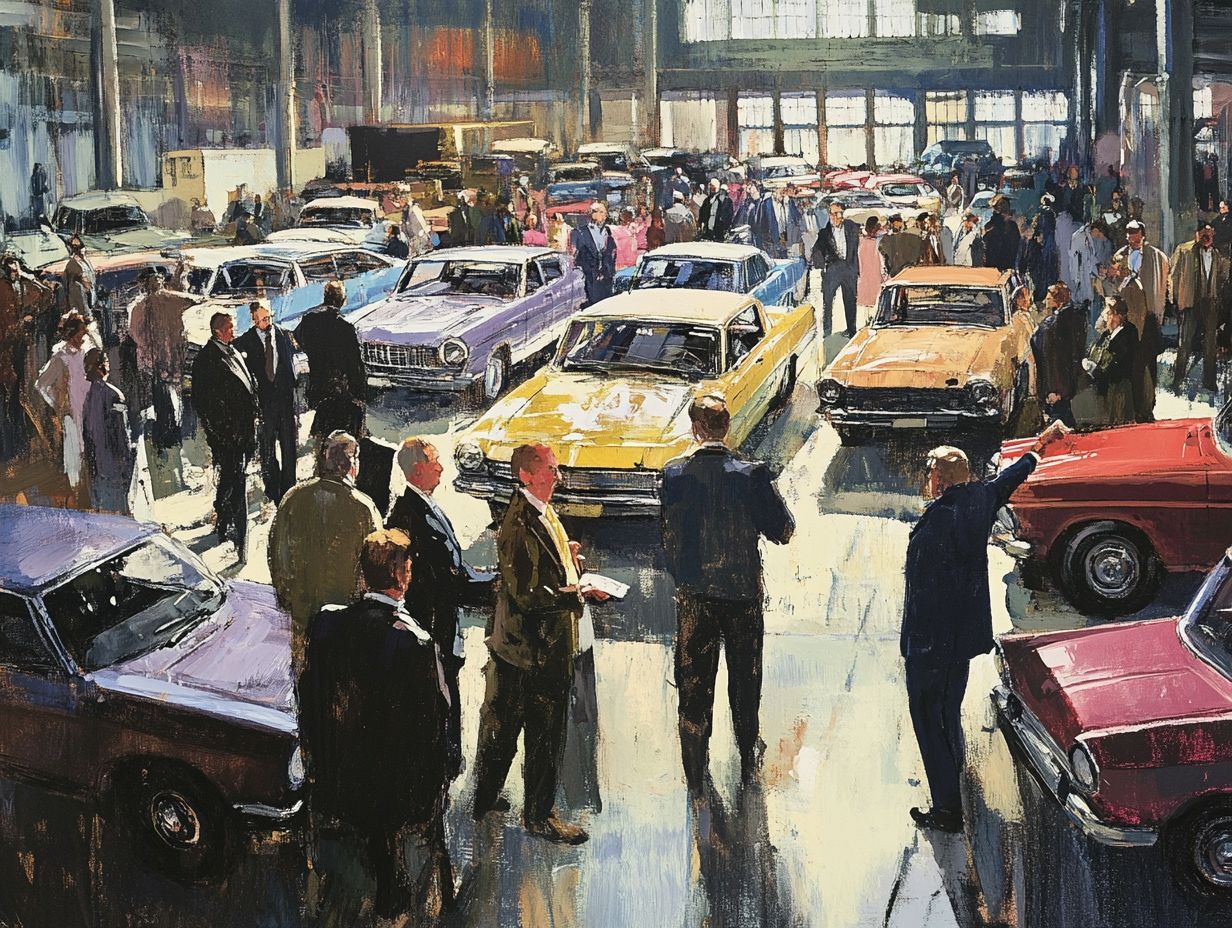
The post-auction process is a pivotal phase that requires you to finalize your purchase. It’s important to grasp any auction fees associated with the transaction and arrange for the transportation of your vehicle.
It s equally essential to ensure that the vehicle meets your expectations in terms of condition. This will provide you with the confidence that your investment aligns with your standards.
Finalizing the Purchase
Finalizing your purchase at a car auction involves several key steps. These include payment, registration, and understanding any auction fees that may apply.
To navigate the auction landscape successfully, you should familiarize yourself with the accepted payment methods. These can range from cash and credit cards to bank transfers and various financing options. Often, a registration fee is required, typically paid upfront to secure your bidder’s number, which is essential for participation.
It’s crucial to grasp any additional auction fees. For instance, the buyer’s premium is an extra fee paid to the auction house on top of the final bid amount, and these can significantly influence the final cost. By paying close attention to these details, you can ensure a smoother purchasing process, ultimately leading to a more rewarding auction experience.
Transporting and Inspecting the Car
Transporting and inspecting your newly acquired car after winning the bid is crucial to ensure it meets your expectations and is in prime condition.
Choosing the right transport method is essential, whether you opt for a flatbed service or decide to drive it home yourself. Once it arrives, conduct a thorough inspection to look for any signs of rust, paint inconsistencies, and tire wear. These could indicate underlying issues.
It’s equally important to assess the engine’s performance and listen for any unusual noises. This helps confirm the vehicle’s reliability. Taking time to examine these details not only prepares you for potential repair costs but also gives you the power to make a well-informed decision before finalizing your purchase.
Dealing with Any Issues
Dealing with issues that arise post-auction, such as unexpected repair costs or concerns about the vehicle’s condition, requires you to take charge.
Staying informed and taking timely action can significantly alleviate the stress associated with these challenges. If the vehicle isn t performing as expected, start by seeking professional inspections to identify any underlying problems.
As a buyer, it’s essential to understand your rights during the auction process. Knowing what warranties or guarantees apply can make all the difference.
By employing a few simple inspection tips beforehand, you can effectively manage potential risks. This paves the way for a smoother ownership experience and greater peace of mind. Stay informed and act quickly to protect your investment!
Frequently Asked Questions
What is an auction and how can I buy a used car at one?

An auction is a public sale where items are sold to the highest bidder. To buy a used car at an auction, you need to register as a buyer and have a budget in mind for the type of car you want to purchase. If you’re considering financing, it’s also helpful to understand how to buy a used car with a loan. Auctions can be in-person or online, and they typically have a wide variety of cars available for sale.
What are the benefits of buying a used car at auction?
Buying a used car at auction can often save you money compared to buying from a dealership. You also have the opportunity to bid on various makes and models, potentially finding a rare or unique vehicle. Additionally, auctions may offer cars at wholesale prices, giving you a chance to get a good deal.
What should I do before attending an auction to buy a used car?
Before attending an auction, it’s important to research the cars available and set a budget for yourself. You should also inspect the cars in person if possible and get a vehicle history report to make an informed decision. It s also helpful to have a mechanic or experienced car buyer accompany you to the auction.
How do I bid on a used car at auction?
To bid on a used car at auction, you will need to be registered as a buyer and have a bidding number. When the car you’re interested in comes up for auction, you can place your bid either in person or online. If you’re concerned about financing, consider researching how to buy a used car with bad credit to better understand your options. Make sure to stick to your budget and be prepared to compete with other bidders.
Can I finance a used car purchased at auction?
Some auctions may offer financing options for buyers, but it’s important to check with the auction beforehand. If financing is not available, you may need to have the funds ready to pay for the car in full immediately after winning the auction. It’s also a good idea to have a backup plan in case financing falls through.
What should I do after buying a used car at auction?
After winning the auction, complete the necessary paperwork and pay for the car. Review the terms and conditions carefully before signing any documents.
Don’t forget to arrange for transportation and have a trusted mechanic inspect your new ride right away!

